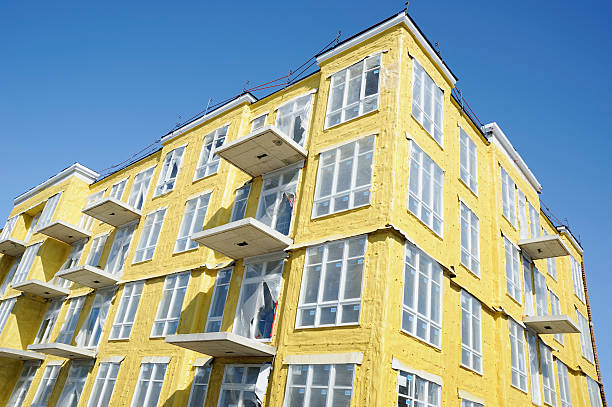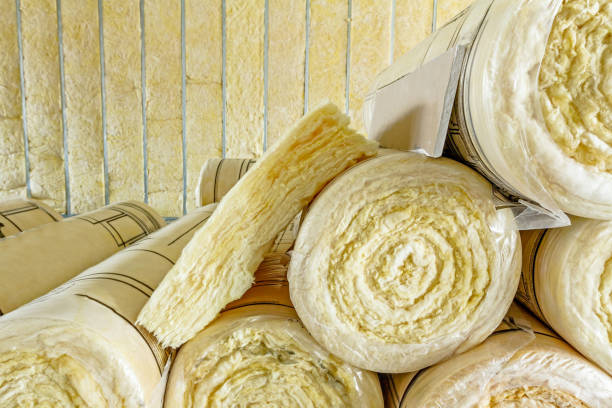What is Insulation in Construction?
Insulation in construction refers to materials and techniques used to reduce heat transfer between the inside and outside of a building. Its primary purpose is to enhance energy efficiency by maintaining a stable indoor temperature, reducing the need for excessive heating or cooling. This not only lowers energy costs but also minimizes environmental impact by decreasing greenhouse gas emissions. Insulation is a critical component in modern construction, playing a vital role in creating comfortable, sustainable, and cost-effective living and working spaces.
There are various types of insulation materials, each with unique properties and applications. For instance, materials like fiberglass,
mineral wool, and
rubber foam are commonly used for their thermal resistance and durability. These materials are designed to provide optimal thermal performance, fire resistance, and environmental sustainability, making them ideal for a wide range of construction projects. Proper insulation can also improve indoor air quality by reducing the infiltration of outdoor pollutants and allergens.
What is the Meaning of Insulation in Construction?
The meaning of insulation in construction extends beyond just keeping a building warm in winter and cool in summer. It encompasses a range of benefits, including improved energy efficiency, enhanced indoor air quality, and better soundproofing. Insulation materials act as a barrier to heat flow, reducing the energy required to maintain a comfortable indoor environment. This is particularly important in regions with extreme climates, where heating and cooling costs can be significant.
Moreover, insulation contributes to the overall sustainability of a building. By reducing energy consumption, it helps lower carbon footprints and supports environmental conservation efforts. For example, eco-friendly insulation options like cellulose and sheep's wool are made from renewable or recycled materials, making them a popular choice for green building projects. Properly insulated buildings also tend to have longer lifespans, as insulation helps protect structural components from temperature-related damage.
Application of Insulation Construction Materials
● Walls:Fiberglass and mineral wool are commonly used for their thermal resistance and ease of installation.
● Roofs and Attics:Cellulose and spray foam are ideal for filling gaps and preventing heat loss or gain.
● Floors:Rigid foam boards or reflective insulation are installed between joists to prevent heat loss and improve soundproofing.
● Pipes and Ducts: Foam or rubber insulation wraps are used to prevent heat loss and condensation in HVAC systems.
● Basements and Crawl Spaces: Moisture-resistant materials like mineral wool or rigid foam are used to prevent dampness and heat loss.
● Commercial Buildings: High-performance materials like polyurethane foam or aerogel are used for energy efficiency and space-saving.
● Retrofitting Old Buildings: Blown-in cellulose or spray foam is ideal for filling existing cavities without major structural changes.
● Soundproofing: Materials like mineral wool or cotton insulation are used to reduce noise transmission between rooms or floors.
What is Insulation Used in Construction?
Insulation is a critical component in construction, designed to reduce heat transfer, improve energy efficiency, and enhance indoor comfort. The choice of insulation material depends on various factors, including the building's design, climate conditions, and specific performance requirements. From traditional options like fiberglass and mineral wool to innovative solutions such as aerogel and cork, each material offers unique benefits and challenges. Below, we explore the most commonly used insulation materials in construction, highlighting their properties, applications, and considerations to help you make informed decisions for your projects.
Fiberglass
Fiberglass is one of the most widely used insulation materials due to its affordability and effectiveness. It consists of fine glass fibers that trap air, reducing heat transfer. Fiberglass is easy to install and can be used in walls, attics, and floors. However, it can cause skin irritation during installation and may not be the best choice for areas with high moisture levels.
Mineral Wool
Mineral wool, made from rock or slag, offers excellent fire resistance and soundproofing properties. It is denser than fiberglass, making it more effective at blocking heat and noise. Mineral wool is also moisture-resistant, making it suitable for use in basements and other damp areas. However, it is more expensive than fiberglass and can be harder to install.
Cellulose
Cellulose insulation is made from recycled paper products, making it an eco-friendly option. It is treated with fire retardants to improve its safety and is often used in attics and walls. Cellulose is effective at filling gaps and provides good thermal performance. However, it can settle over time, reducing its effectiveness, and may absorb moisture if not properly installed.
Polystyrene (EPS and XPS)
Polystyrene insulation comes in two forms: expanded (EPS) and extruded (XPS). EPS is lightweight and affordable, while XPS is denser and offers higher moisture resistance. Both types provide excellent thermal performance and are commonly used in walls, roofs, and foundations. However, polystyrene is not biodegradable and can be harmful to the environment if not disposed of properly.
Polyurethane Foam
Polyurethane foam is a versatile insulation material that can be sprayed or injected into cavities. It provides excellent thermal performance and air sealing properties, making it ideal for hard-to-reach areas. Polyurethane foam is also moisture-resistant and can help improve a building's structural integrity. However, it is more expensive than other insulation materials and requires professional installation.
Reflective Insulation
Reflective insulation is typically made from aluminum foil and is used to reflect radiant heat. It is commonly installed in attics, roofs, and walls to reduce heat gain in hot climates. Reflective insulation is lightweight and easy to install, but it is less effective in colder climates where conductive heat loss is more significant.
Cotton (Denim) Insulation
Cotton insulation, made from recycled denim, is an eco-friendly option that provides good thermal and acoustic performance. It is safe to handle and does not cause skin irritation, making it a popular choice for DIY projects. However, it is more expensive than traditional insulation materials and may require additional fire retardants.
Sheep's Wool Insulation
Sheep's wool is a natural insulation material that is both sustainable and effective. It has excellent thermal and moisture-regulating properties, making it suitable for a variety of climates. Sheep's wool is also fire-resistant and can improve indoor air quality by absorbing pollutants. However, it is one of the more expensive insulation options available.
Aerogel
Aerogel is a high-performance insulation material known for its extremely low thermal conductivity. It is lightweight and provides excellent insulation in thin layers, making it ideal for applications where space is limited. However, aerogel is very expensive and is typically used in specialized projects rather than general construction.
Cork Insulation
Cork insulation is made from the bark of cork oak trees and is a renewable, eco-friendly option. It provides good thermal and acoustic insulation and is naturally resistant to moisture and pests. Cork is also durable and can last for many years without degrading. However, it is more expensive than many other insulation materials.
How to Choose Insulation for Different Construction Projects?
Choosing the right insulation for a construction project depends on several factors, including climate, building type, budget, and specific performance requirements. For example, in cold climates, materials with high R-values, such as polyurethane foam or mineral wool, are ideal for preventing heat loss. In hot climates, reflective insulation or cellulose can help reduce heat gain and improve energy efficiency.
It's also important to consider the specific application. For walls, fiberglass or mineral wool are common choices due to their ease of installation and effectiveness. For attics and roofs, spray foam or cellulose can provide a seamless barrier against heat transfer. Additionally, eco-friendly options like cotton or sheep's wool are excellent choices for sustainable building projects. Consulting with insulation experts can help ensure that the right materials are selected for each unique project.
How to Insulate New Construction?
Insulating new construction involves careful planning and installation to ensure optimal energy efficiency and comfort. For walls, insulation is typically installed between the studs before the drywall is added. Materials like fiberglass batts or spray foam are commonly used for this purpose. Proper installation is crucial to avoid gaps that can reduce the insulation's effectiveness.
For floors, rigid foam boards or reflective insulation can be installed between the joists to prevent heat loss and improve soundproofing. In roofs and attics, insulation is installed either between the rafters or on the attic floor, depending on the design of the building. Materials like cellulose or spray foam are ideal for these areas, as they can fill gaps and provide a continuous thermal barrier. Proper insulation in new construction not only improves energy efficiency but also enhances the overall comfort and durability of the building.
FUNAS Provides Best House Insulation for Energy Efficiency
FUNAS, established in 2011, is a leading manufacturer of high-quality insulation materials, including rubber foam, mineral wool, and
glass wool. With a focus on energy efficiency and sustainability, FUNAS offers customized solutions for various industries, from construction to HVAC. Our products are designed to meet international standards, ensuring durability and performance.
If you're looking for reliable
insulation solutions, FUNAS is your trusted partner. Contact us today to learn more about our products and how we can help you achieve your energy efficiency goals.
Conclusion
Insulation is a vital component of modern construction, offering numerous benefits such as improved energy efficiency, enhanced indoor comfort, and reduced environmental impact. By choosing the right insulation materials and ensuring proper installation, builders and homeowners can create sustainable, cost-effective, and comfortable living spaces. Whether you're working on a new construction project or retrofitting an existing building, understanding the different types of insulation and their applications is key to achieving the best results.
If you're looking for high-quality insulation solutions, consider exploring options from reputable
insulation materials manufacturers like FUNAS. With a wide range of materials and customization options available, you can find the perfect insulation to meet your specific needs. Contact a trusted supplier today to learn more about how insulation can benefit your next project.
FAQs
How does insulation work to improve energy efficiency?
Insulation reduces heat transfer between the inside and outside of a building, helping maintain a stable indoor temperature. This reduces the need for excessive heating or cooling, lowering energy consumption and costs.
Can insulation improve indoor air quality and comfort?
Yes, insulation helps regulate indoor temperature and humidity levels, creating a more comfortable living environment. It also reduces the infiltration of outdoor pollutants and allergens, improving indoor air quality.
What are the cost savings associated with good insulation?
Proper insulation can significantly reduce heating and cooling costs, often paying for itself within a few years through energy savings. It also increases the overall value of a property.
How much does it cost to insulate a home?
The cost of insulating a home varies depending on the type of insulation, the size of the property, and the complexity of the installation. On average, homeowners can expect to spend between 1,500and1,500and3,500 for a typical project.
How long does insulation last, and when should it be replaced?
Most insulation materials last for 20-30 years, but this can vary depending on the type and quality of the material. Insulation should be inspected regularly and replaced if it shows signs of damage, settling, or moisture absorption.






























































